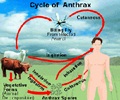A major anthrax scare has broken out in the UK. This time it has nothing to do with any powder mailed, it is all blamed on contaminated heroin. Five are already dead and six others infected in Scotland.
Anthrax is an acute bacterial infection most commonly found in hoofed animals such as cattle, sheep and goats. It usually infects humans when they inhale or ingest anthrax spores, but cannot be passed from person to person.The current outbreak in Scotland was discovered three weeks ago when tests carried out on a drug user who died in a Glasgow hospital confirmed the presence of anthrax.
It was the first anthrax death in Britain since Fernando Gomez, a 34-year-old drum-maker from London, died in October 2008 after inhaling the spores while handling untreated animal hides.
Health Protection Scotland has already called upon all heroin users to stop using the drug, regardless of whether they inject it or take it by other means.
Colin Ramsay, consultant epidemiologist at Health Protection Scotland, said: "Evidence now suggests that potentially contaminated heroin may be in circulation in other parts of Scotland, not just the Glasgow area.
"All heroin users need to be aware of the risks – contaminated heroin is potentially dangerous taken by any route, not just injection. I would advise heroin users to stop using heroin and seek advice from local harm reduction and drug services for support.
Advertisement
Signs of infection include soreness at the injecting site, developing into redness and then spreading into a black "scar". If not treated at this stage the infection can spread into the blood and other organs.
Advertisement
"It is extremely rare for anthrax to be passed from person to person and there is no evidence of a significant risk of airborne transmission associated with the current situation."
The present spread of anthrax poses one of the greatest dangers to addicts since 23 injecting users in Glasgow died ten years ago during an outbreak linked to heroin contaminated with the Clostridium novyi bacterium. A fatal accident Inquiry in 2001 led to Sheriff Edward Bowen criticising communications between public health and accident and emergency staff on information about the outbreak.
Gordon Meldrum, director general of the Scottish Crime and Drug Enforcement Agency, and drugs spokesman for the Association of Chief Police Officers in Scotland, pointed out, "Illegal drugs are often prepared in unhygienic surroundings and can be vulnerable to contamination from various harmful agents.
"Those involved in the trafficking of drugs are driven by profit and have no care for the harm they can cause or the health of those who take these potentially lethal drugs."
It was highly probable that the contamination had occurred by accident, he added.
Mr Meldrum advised drug users who feel ill to contact the NHS.
Source-Medindia
GPL










